7 tests to check if your VPN is working
Using a VPN allows you to browse the web anonymously — but only if it’s working properly. VPN malfunctions can reduce your online privacy without your knowledge. Use the tests below to find out if your VPN is working. Then, get a trusted VPN with a kill switch to cut off your internet connection if your VPN suddenly disconnects.

A virtual private network (VPN) encrypts the data you send and receive online, helping disguise your browsing activities. But what happens when it fails?
When your VPN stops working, even momentarily, your real IP address is exposed. This is called a VPN leak — a serious malfunction that can reduce your online privacy and expose your physical location and personal data. VPN leaks can make you traceable to marketers and organizations and possibly even expose you to cyberattacks.
Some signs of a VPN not working include seeing ads tailored to your location and being unable to access content that your VPN typically unlocks. Luckily, there are ways to determine if your VPN is leaking your true IP. Keep reading to learn how to conduct VPN tests and find out if your VPN is doing its job.
1. Make sure your VPN is connected
First, make sure that your VPN is connected. VPNs must be turned on to mask your web activity. Sometimes, they can turn off on their own due to poor network connections, errors, or other network settings.
If you’re using a free VPN with limited functionality, it may turn off when you’ve reached your data limit. Using an advanced VPN with a kill switch protects you by disconnecting you from the internet if the VPN malfunctions.
Confirming that your VPN is active is always the first step you should take.
How to test if your VPN is connected
Follow the steps below for the Norton VPN mobile app. Steps should be fairly similar across different VPNs and devices, with a “connect” button or toggle for easy access.
- Open the Norton VPN app.
- On the homescreen, you can see whether the VPN is on or off.
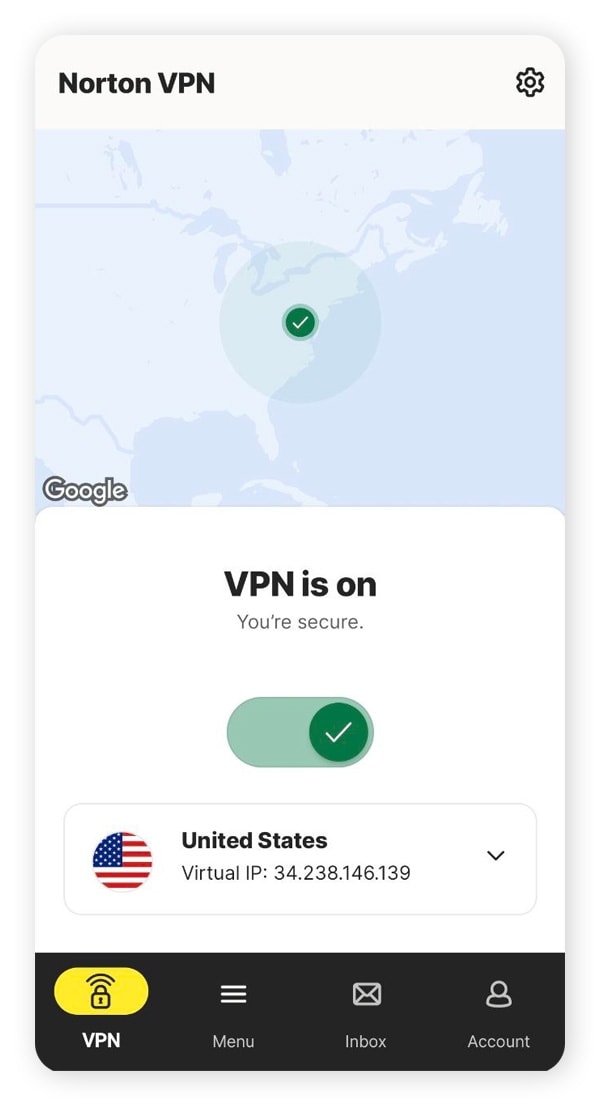

What to do if your VPN is not connected
If your VPN is not connected, turn it on to activate your protection. If that doesn’t work, restart your VPN app and device, then try again.
If you can’t use the internet with your VPN turned on, your internet service provider (ISP) may be at fault. Some ISPs block VPN traffic.
To test this, connect to your mobile network (as opposed to your home/work Wi-Fi network) and open your mobile VPN app. If your VPN works on your mobile network, it means your ISP may be blocking your VPN.
2. Check your internet speed
Checking your internet speed can help you understand if your VPN is working properly or not.
When your VPN is on, you will probably notice a slight decrease in internet speed due to the rerouting of your web traffic through a different server.
If you notice no speed changes or extreme speed changes, there might be a problem with your VPN — although some premium VPNs, like Norton VPN, have high-speed servers.
- No speed changes: Your VPN may not be working.
- Extremely slow speeds: Your VPN may have server problems. Or, your firewall or antivirus may be clashing with your VPN.
- Inconsistent speeds: Your VPN may be losing connection intermittently.
How to test your internet speed
Is your VPN affecting your internet speed? Here’s how to check.
1. Turn off your VPN.
2. Turn off background apps that may affect internet speed, such as streaming apps, gaming apps, messaging apps, and social media apps.
3. Go to speedtest.net to run a free test.
4. Confirm your server is correct and click Go.
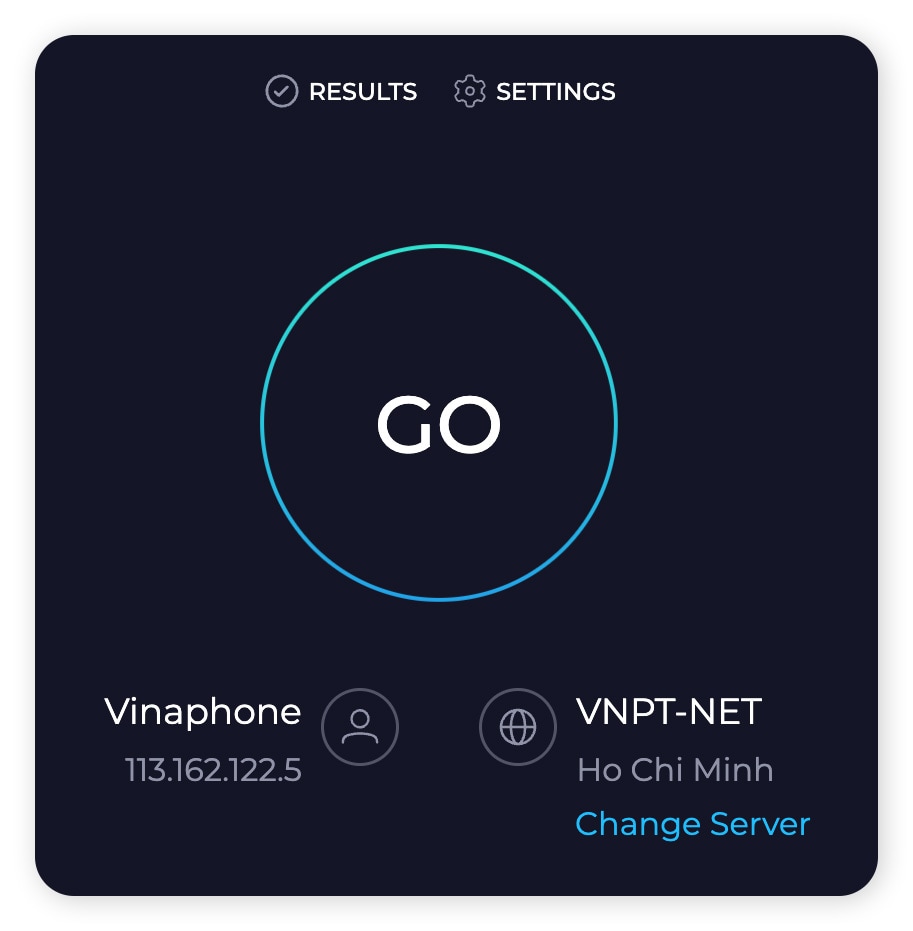

5. Take a screenshot of your results, including the download speed, upload speed, and ping.
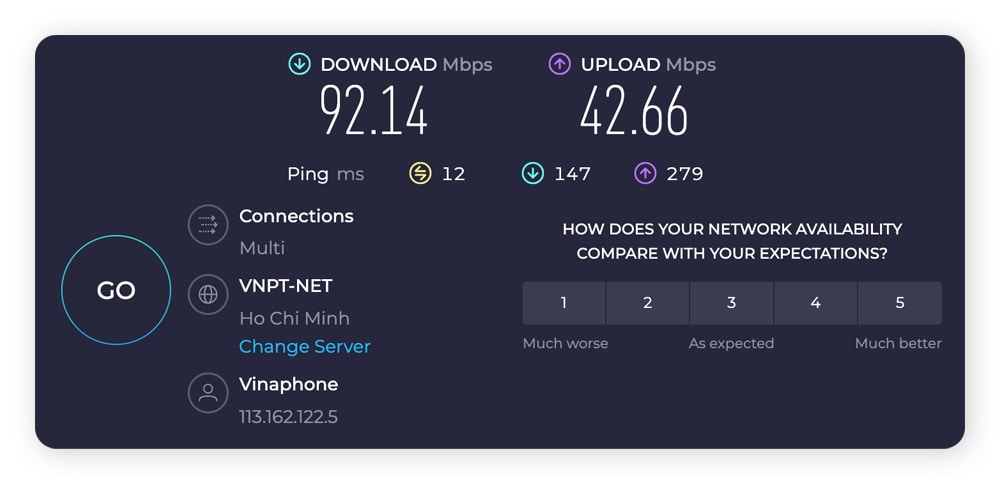

6. Repeat the steps with your VPN turned on. When confirming your server, make sure you’ve selected your VPN server and not your home server.
After completing both tests, compare the screenshots to see how your VPN affects your internet speed.
If your VPN is working, you should notice a slight decrease in download speed and upload speed, and a slight increase in ping.
What to do if your internet connection is slow
If your connection is very slow, you may have an issue with your VPN. Here are a few possible solutions.
- Restart your VPN.
- Update your VPN.
- Change your VPN’s server location to somewhere closer to your actual location.
- Check your antivirus or firewall settings. If possible, add your VPN to the exceptions list or whitelist to prevent interference.
- Open your VPN settings and manually switch to a different VPN protocol, such as WireGuard or IKEv2.
- In your VPN settings, enable split tunneling. This allows you to exclude certain traffic from going through your VPN.
3. Look up your current IP address
Your VPN’s job is to mask your IP address by sharing the VPN server’s address instead. So, checking your IP is a good way to find out whether your VPN is working.
How to look up your IP address
To find out if your VPN is working by looking up your IP address:
- Turn off your VPN.
- Go to What Is My IP? to check your IP for free, or simply Google What is my IP address and your IP address should display. Before you do this, make sure you’re not connected to your VPN.
- Take a screenshot of your IP address.
- Next, turn on your VPN and repeat step 2 above. Compare the IP addresses and make sure they are different.
If your IP changes when your VPN is active, it means your VPN is working.
What to do if you still see your old IP address
If you’re still seeing your regular IP address when your VPN is on, it means your VPN is not working. Here are some potential fixes:
- Restart your VPN.
- Update your VPN.
- Change your VPN’s server location.
- Check your antivirus or firewall settings. If possible, add your VPN to the exceptions list or whitelist to prevent interference.
- Open your VPN settings and manually switch to a different protocol.
4. Check for DNS leaks
DNS stands for Domain Name System. This system translates website names into the long IP addresses that identify them, allowing your computer to connect to the correct servers.
If your VPN isn’t working properly, DNS requests can bypass your VPN and go directly to your ISP, revealing your web activity. This is called a DNS leak, and it exposes your real IP address even if you’re using a VPN.
How to test for DNS leaks
Here’s how to find out if DNS leaks are affecting your online privacy:
1. Turn off your VPN.
2. Go to dnsleaktest.com.
3. Click Standard test.
4. Note the DNS servers and IP address in the results.
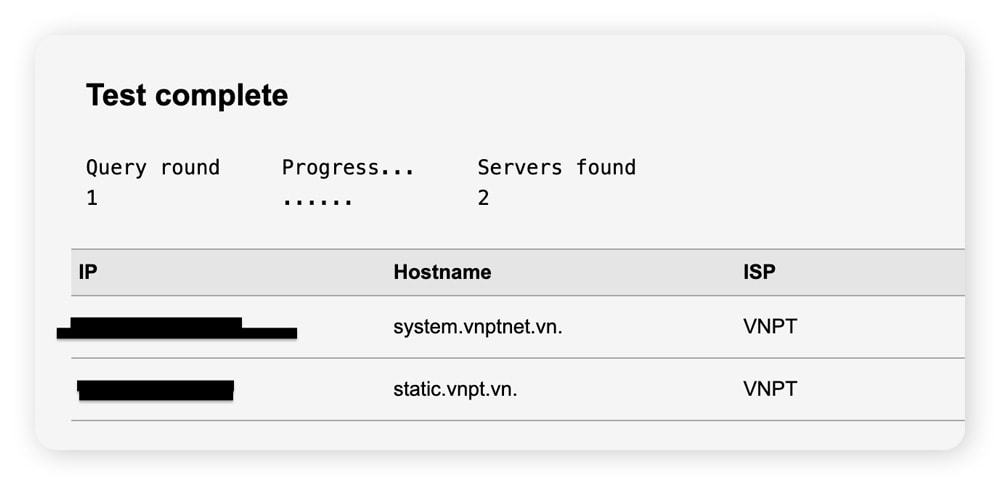

5. Next, turn on your VPN and repeat steps 2-4 above.
If any of the servers listed in the test results are not provided by your VPN service, then you have a DNS leak.
What to do if you find DNS leaks
If you’ve detected DNS leaks, your web browsing is not private. Here are some ways to fix the problem:
- Restart and update your VPN (then test for leaks again).
- Go to your VPN settings and enable DNS leak protection.
- Open your VPN settings and manually switch to a different protocol.
If these steps don’t work, you can manually change your DNS servers to a privacy-focused public DNS provider. This bypasses your ISP’s DNS and may prevent leaks.
Some popular privacy-focused public DNS servers include:
- Quad9 DNS: 9.9.9.9 and 149.112.112.112
- Cloudflare DNS: 1.1.1.1 and 1.0.0.1
Configure DNS servers on Windows
- Go to Start > Settings > Network & internet.
- Choose your network > click Edit (next to DNS server assignment) > choose Manual from the dropdown list.
- Type in the DNS servers you want to use in the Preferred DNS box > click Save.
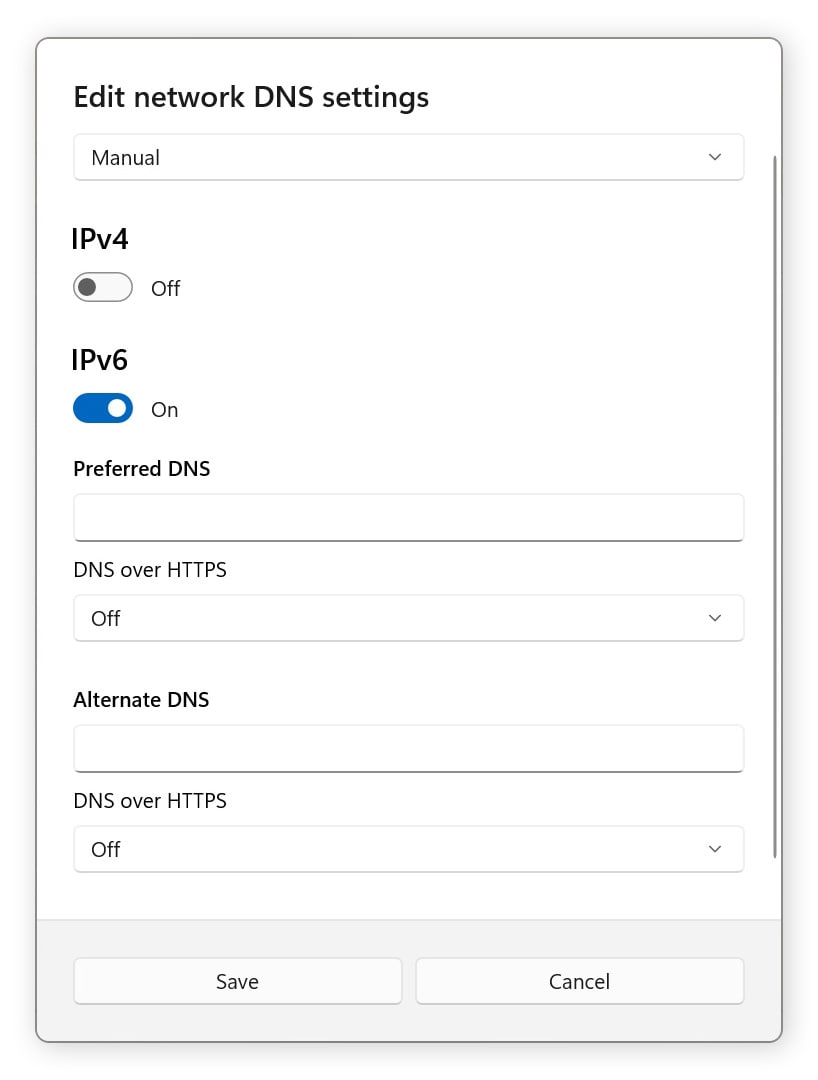

Configure DNS servers on Mac
- Go to System Settings > Network > select your network.
- Click Details > DNS > +, then add the DNS servers and click OK.
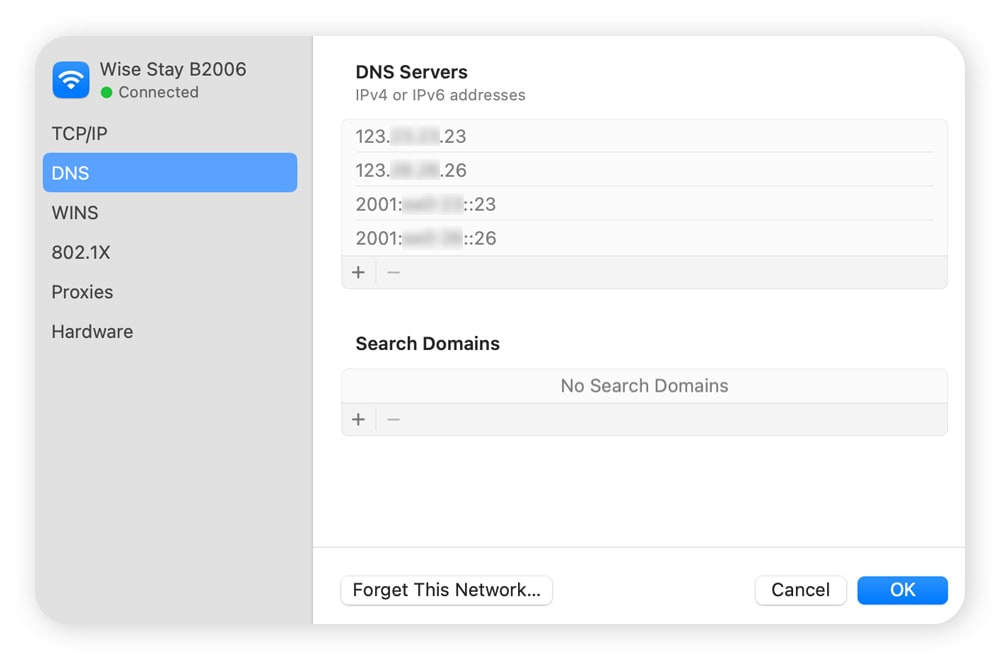

Configure DNS servers on iPhone
- Go to Settings > Wi-Fi > select your Wi-Fi network.
- Select Configure DNS > tap Manual > tap the red minus sign to delete any existing DNS servers.
- Tap Add Server > enter the DNS servers you want to use > tap Save.
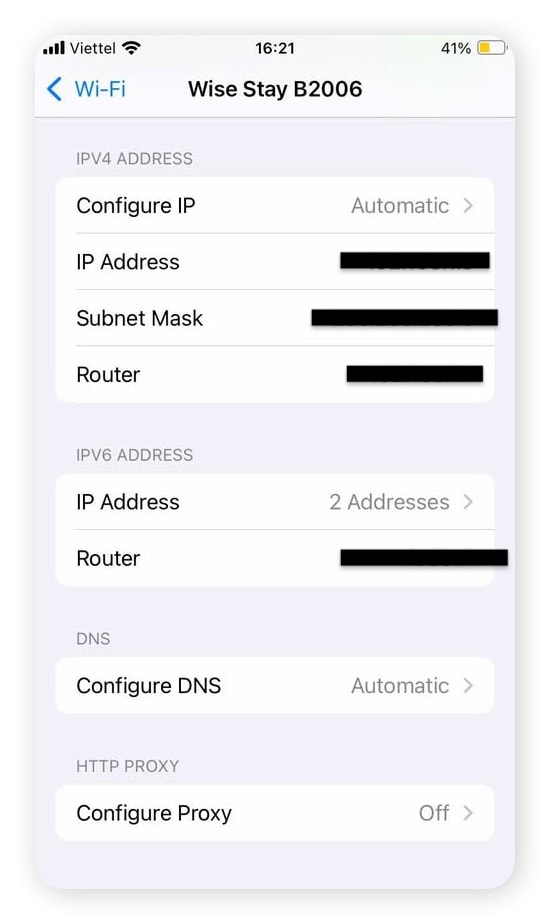

Configure DNS servers on Android
Steps may vary depending on your Android model and operating system version.
- Go to Settings > Wi-Fi > long-press your network.
- Tap Modify network > select Show advanced options > change IP settings to Static.
- Enter the DNS servers you want to use > tap Save.
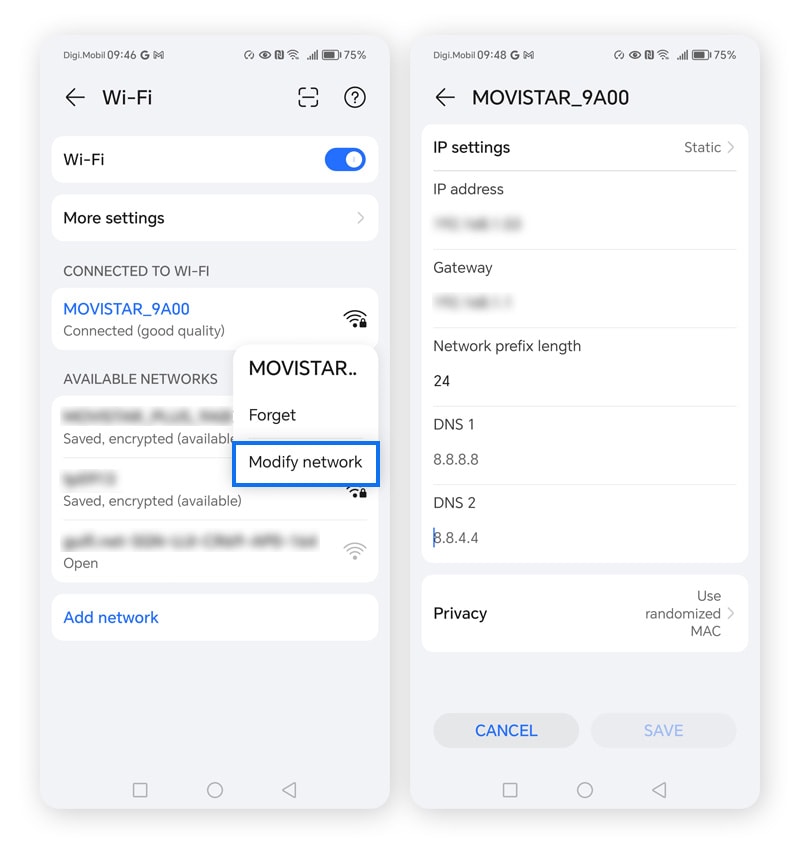

5. See if there are any prefetching VPN leaks
Prefetching VPN leaks happen when extensions “prefetch” a domain before you visit a website.
Browsers have a function called “prefetching” that predicts which websites you’re going to visit. This makes searches quicker and more efficient. However, it can come at the cost of reduced online privacy and data security.
Some browsers may allow prefetch DNS requests to bypass VPN protection if your VPN doesn’t enforce DNS leak protection at the system level. This exposes your true IP address.
How to test if there are any prefetching VPN leaks
Here’s how to test if your IP is getting exposed by prefetching leaks:
- Perform a DNS leak test with your VPN turned off to identify your normal DNS servers and IP address, and perform another one with your VPN turned on.
- Take note of your normal and VPN DNS servers and IP addresses.
- With your VPN turned on, open a new browser tab.
- Type a website URL into the browser bar, but don’t click Enter or visit the site. This will trigger a prefetching event.
- Run another DNS leak test (with your VPN still on).
- Check the test results to ensure that all DNS servers and IP addresses belong to your VPN.
If your normal DNS servers or IP address appear in the test results, you may have a prefetching leak.
What to do if there are prefetching VPN leaks
There are a few simple ways to prevent prefetching VPN leaks:
- If you’re on an Apple device, use Safari. Prefetching is disabled by default on Safari, preventing prefetching leaks.
- Enable DNS leak prevention on your VPN. This should cover prefetching leaks, too.
Another way to prevent prefetching VPN leaks is to disable prefetching in your browser.
Google Chrome
- Click the three vertical dots in the top right, then Settings.
- Select Performance in the sidebar menu.
- Under the Speed menu, disable Preload pages by toggling the option off.
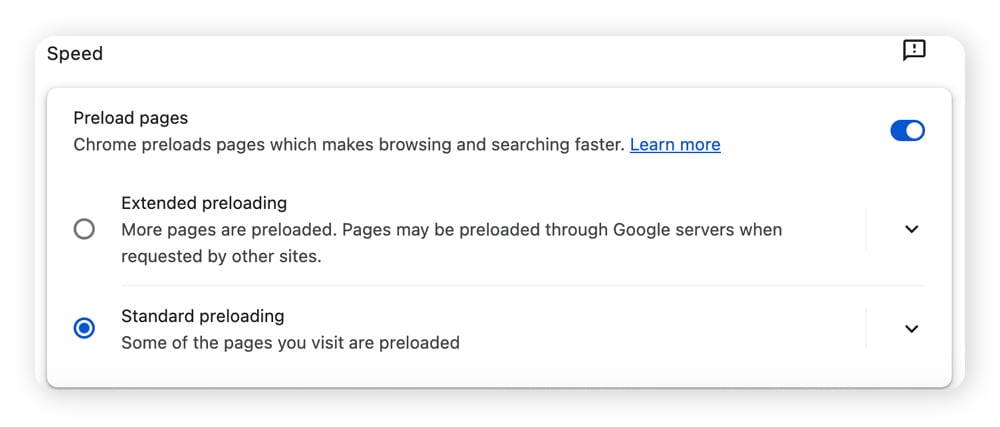

Microsoft Edge
- Click the three-dot menu in the top right, then Settings.
- Search for Preload pages, then toggle off Preload pages for faster browsing and searching.
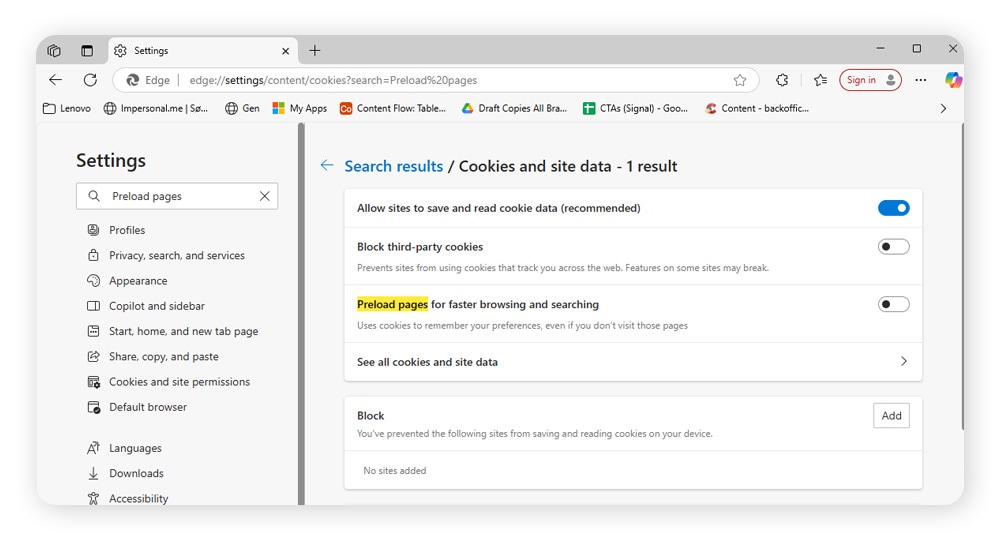

Firefox
- Type about:config in the URL address bar.
- In the new search bar, search for network.prefetch-next.
- Change the setting from true to false.
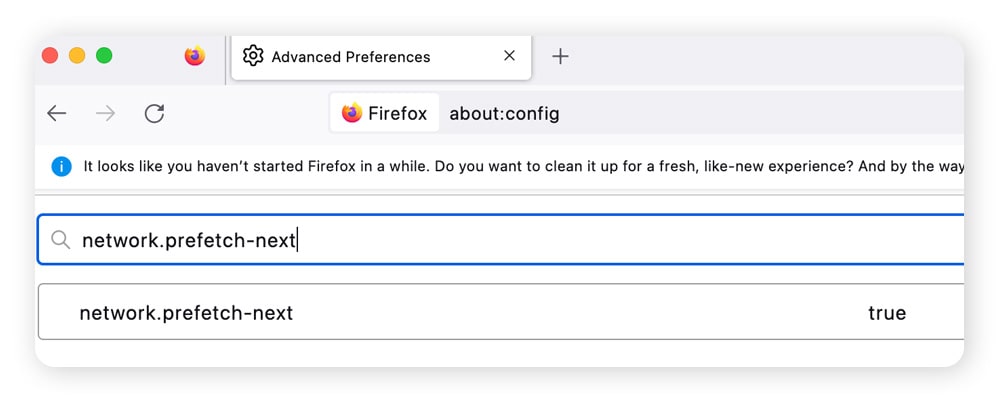

6. See if there are any WebRTC leaks
WebRTC leaks happen when your true IP address is leaked through your browser’s WebRTC functionality.
What’s that? WebRTC assists with peer-to-peer features on your browser (video chatting, file sharing, etc.) without the need to install plugins or other apps.
When WebRTC enables a peer-to-peer connection, it uses a special type of server called a STUN (Session Traversal Utilities for NAT) to verify your IP address. When making a request, WebRTC may bypass the VPN server and send it directly to the STUN. This prevents your VPN from masking your real IP address.
How to test if there are any WebRTC leaks
Follow the steps below to determine if you have a WebRTC leak:
- Turn your VPN on.
- Go to browserleaks.com/webrtc.
- View the results and confirm that your IP is not your regular IP.
- Check that you passed the WebRTC Leak Test (indicated with a green tick).
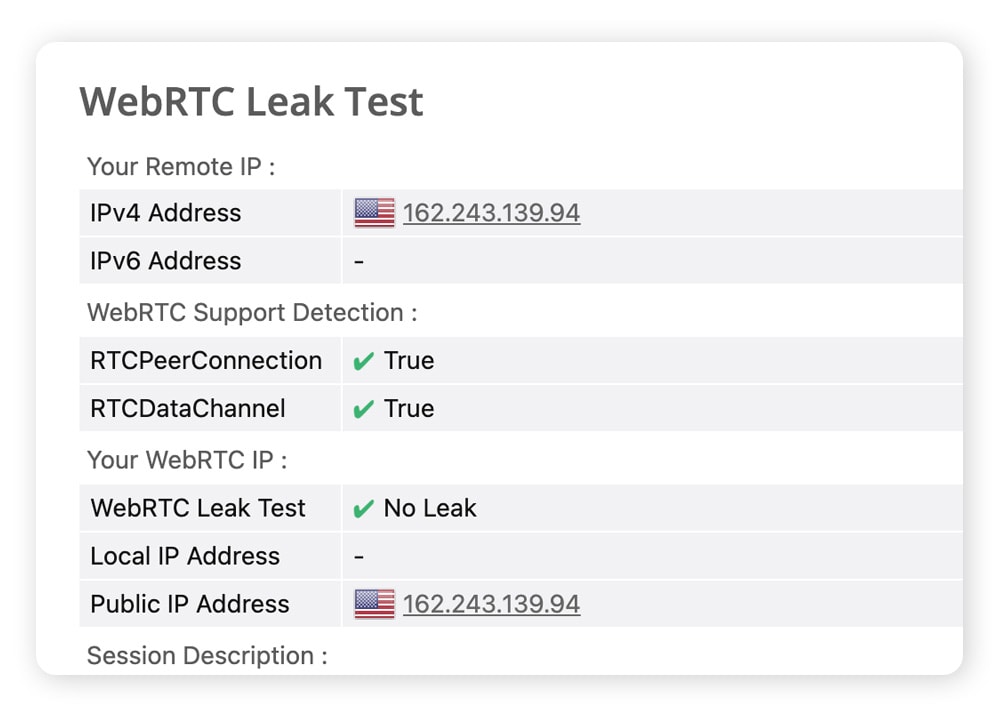

What to do if you find WebRTC leaks
The most secure way to prevent WebRTC leaks is to disable WebRTC in your browser. However, this may not be ideal for everyone. Disabling WebRTC can interfere with many plug-ins, apps, and online tools that require WebRTC. Just a few of these include multiplayer games, voice/video chatting, streaming, and file sharing.
It’s a much better idea to use a VPN with built-in WebRTC leak protection, such as Norton VPN. It automatically detects when WebRTC attempts to reveal your IP address and replaces it with the VPN’s IP address. This keeps your true IP hidden even when you engage in peer-to-peer activities online.
7. See if there are any browser extension leaks
If you’re using a browser-based VPN rather than a system-level one, extension traffic might bypass the VPN, as some browser extensions (ad blockers, productivity tools, etc.) communicate directly with external servers. This communication can bypass the VPN tunnel, exposing your real IP address.
How to test if there are any browser extension leaks
Here’s how to find out if your browser extensions are causing a VPN leak:
- Turn off your VPN.
- Visit whatismyIP.com and make a note of your true IP address.
- Turn on your VPN.
- Disable all browser extensions.
- Visit whatismyIP.com to check your VPN IP address.
- Enable your browser extensions one by one. After enabling each one, check your IP.
If your true IP appears during a test, you can assume that the browser extension is causing a VPN leak.
What to do if there are browser extension leaks
If one or more of your browser extensions is causing a VPN leak, here are a few ways to fix the problem:
- Remove the extension.
- Disable the extension while using a VPN.
- Replace the extension with a more secure alternative.
- Enable DNS leak protection on your VPN.
Get a VPN that works
Do you want your VPN leak tests to come back clean? Then get a VPN that works. Effective VPNs come packed with security features that protect you from VPN leaks. These include WebRTC leak protection, DNS leak protection, split tunneling, kill switches, and more. When your VPN does its job, you stay safer online.
Most free VPNs don’t provide the necessary security or VPN leak protection to fully safeguard your privacy online. Instead, get a VPN that offers comprehensive protection like Norton VPN. Norton VPN includes essential leak protection features and helps keep your important online data more private. Get Norton VPN for more secure and private browsing.
FAQs
How do VPN leaks happen?
VPN leaks often occur due to DNS leaks, WebRTC leaks, prefetching leaks, browser extension leaks, or VPN provider issues. You should look for a VPN with a kill switch to keep you better protected if something goes wrong with your secure connection.
How do I know if the VPN on my phone is working?
Turn off your mobile VPN and check your IP address. Then, check it again with your VPN turned on. If the IP address is different, your VPN is working.
Can a VPN be hacked?
You can be hacked when using a VPN, but it’s very difficult. It’s much easier to be hacked without a VPN than with one.
Can my ISP block my VPN?
Yes, ISPs can block your VPN. They can do this by blocking any IP addresses of known VPN servers or by blocking VPN protocols.
Can a firewall block a VPN?
Yes, it’s possible for a firewall to block the IP address produced by your VPN. This can prevent your VPN from working properly.
What is VPN IP Rotation?
VPN IP Rotation is a VPN feature that automatically changes your IP address at regular intervals. This makes it harder for site trackers to collect your data, as they might not work if your information no longer matches what they were tracking.
Editorial note: Our articles provide educational information for you. Our offerings may not cover or protect against every type of crime, fraud, or threat we write about. Our goal is to increase awareness about Cyber Safety. Please review complete Terms during enrollment or setup. Remember that no one can prevent all identity theft or cybercrime, and that LifeLock does not monitor all transactions at all businesses. The Norton and LifeLock brands are part of Gen Digital Inc.


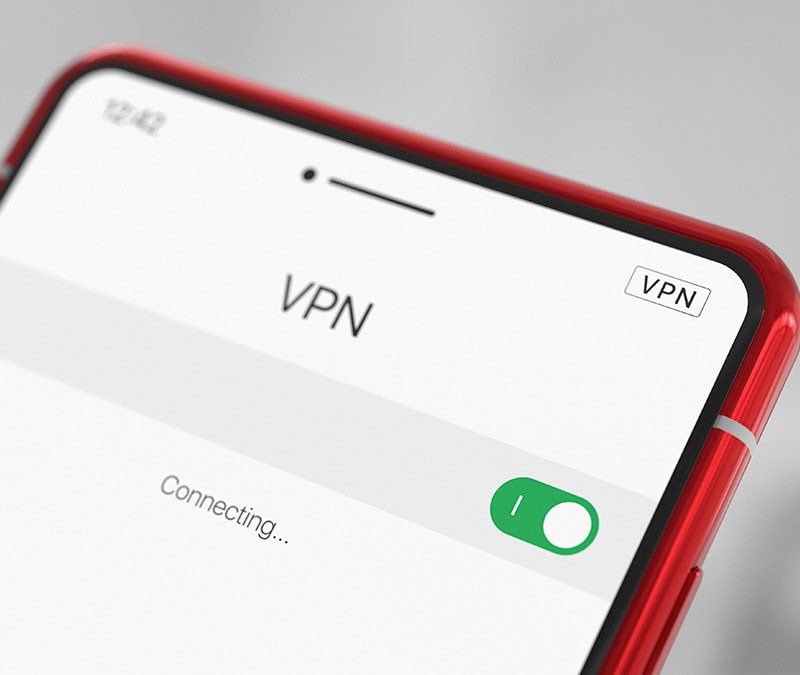





Want more?
Follow us for all the latest news, tips, and updates.